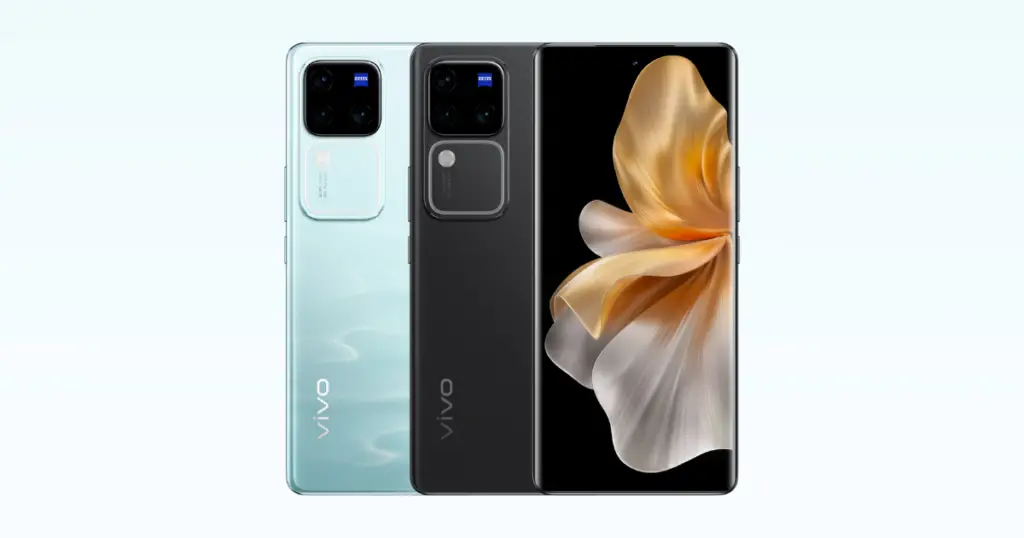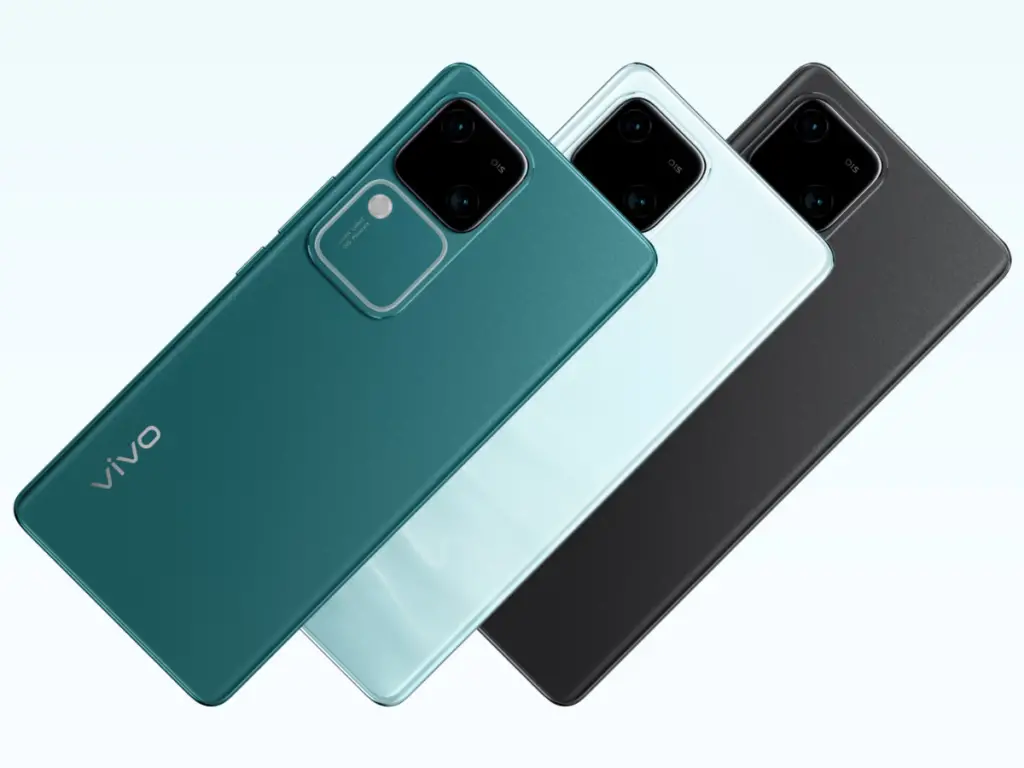Vivo has recently launched its V30 series in India, comprising the Vivo V30 and V30 Pro. Both phones boast impressive features, catering to users who prioritize style, performance, and photography. This post dives deep into the details of these phones, including their pricing, key specifications, AnTuTu benchmark scores, and expected performance.

V30 Pro
Contents
A Glimpse into the Vivo V30 Series
The Vivo V30 and V30 Pro offer a compelling proposition for smartphone users in India. Both phones flaunt a sleek design with a large, immersive display. However, they differ slightly under the hood. The V30 goes with a Qualcomm Snapdragon 7 Gen 3 processor, while the V30 Pro boasts a MediaTek Dimensity 8200 chipset.
Both pack ample RAM and storage options, ensuring smooth performance for everyday tasks and multitasking. The camera systems on both phones are impressive, with a focus on high-resolution photography, and they come equipped with long-lasting batteries with fast-charging capabilities.
Unveiling the Display: A Feast for the Eyes
The Vivo V30 and V30 Pro boast stunning 6.78-inch AMOLED displays with a 120Hz refresh rate. This translates to incredibly smooth visuals, especially when scrolling through social media or playing games. The displays also offer a sharp 1.5K (2800 x 1260 pixels) resolution, ensuring crisp and detailed visuals for watching videos or browsing the web.
Additionally, the displays boast a peak brightness of 2800 nits, making them easily readable even under bright sunlight.

Processing Power: Snapdragon vs. MediaTek
The key difference between the V30 and V30 Pro lies in their processors. The V30 opts for the Qualcomm Snapdragon 7 Gen 3, a capable mid-range chipset known for its efficiency and balanced performance. The V30 Pro, on the other hand, utilizes the MediaTek Dimensity 8200, a more powerful chipset geared towards demanding tasks and gaming.
Ultimately, the choice between these processors depends on your needs. If you prioritize efficiency and everyday tasks, the Snapdragon 7 Gen 3 in the V30 might suffice. However, if you’re a power user who enjoys mobile gaming or intensive multitasking, the Dimensity 8200 in the V30 Pro might be a better fit.
Camera Capabilities: Capturing Every Detail
Both Vivo V30 and V30 Pro flaunt impressive quad-camera setups on the back. The main sensor on both phones is a high-resolution 50MP shooter, capable of capturing stunning photos with exceptional detail. They are accompanied by two additional 50MP sensors, likely serving as an ultrawide and telephoto lens, offering versatility for capturing various scenarios. Additionally, a 50MP front camera adorns both phones, catering to selfie enthusiasts and video calls.
Battery Life and Charging: Powering Through the Day
Both the Vivo V30 and V30 Pro pack a hefty 5000mAh battery, promising excellent endurance on a single charge. This is particularly beneficial for users who are on their phones throughout the day.
Complementing the large battery capacity, both phones support fast charging, which is a welcome feature for those who frequently run low on battery. While the exact charging speed hasn’t been officially revealed yet, based on previous Vivo models, we can expect it to be in the range of 44W or even faster.
Storage Options: Keeping Your Memories Safe
The Vivo V30 and V30 Pro cater to diverse storage needs with multiple options. The V30 comes in three configurations: 8GB RAM with 128GB storage, 8GB RAM with 256GB storage, and 12GB RAM with 512GB storage. The V30 Pro offers two variants: 8GB RAM with 256
Price and Availability
The Vivo V30 comes in three storage variants:
- 8GB RAM + 128GB storage: ₹33,999
- 8GB RAM + 256GB storage: ₹35,999
- 12GB RAM + 512GB storage: ₹37,999
The Vivo V30 Pro is available in two storage options:
- 8GB RAM + 256GB storage: ₹41,999
- 12GB RAM + 512GB storage: ₹46,999
Both phones will be available for pre-order starting March 7th, 2024, and will go on sale from March 14th, 2024. You can purchase them from Flipkart, Vivo India’s online store, and authorized offline retailers.
Software Experience: FunTouchOS 14 on Android 14
The Vivo V30 and V30 Pro run on FunTouchOS 14, Vivo’s custom user interface based on the latest Android 14 operating system. FunTouchOS offers a plethora of customization options and features on top of the stock Android experience. However, it’s important to note that some users might find the additional bloatware pre-installed on Vivo phones intrusive.
Benchmarking Muscle: AnTuTu Scores Explained
AnTuTu is a popular benchmarking tool that measures a smartphone’s overall performance. While real-world usage can vary, AnTuTu scores provide a general idea of a phone’s processing power, graphics capabilities, memory management, and user experience.
The Vivo V30 Pro boasts an impressive AnTuTu score of around 948,361, reflecting its powerful MediaTek Dimensity 8200 chipset. The Vivo V30, with its Snapdragon 7 Gen 3 processor, is expected to have a score in the range of 750,000 to 800,000, indicating a still capable mid-range performance.
Performance Expectations: Everyday Tasks and Gaming
Based on the specifications and AnTuTu scores, both the Vivo V30 and V30 Pro are expected to handle everyday tasks like browsing the web, social media usage, and streaming videos with ease. The V30 Pro, with its more powerful processor, should excel in multitasking and demanding applications. However, for hardcore gamers who prioritize high frame rates in graphically intense titles, the V30 Pro might be the better choice
Here’s a quick recap to help you decide
- Choose the Vivo V30 if:
- You prioritize efficiency and everyday tasks.
- You’re on a tighter budget.
- Choose the Vivo V30 Pro if:
- You’re a power user who enjoys demanding applications and gaming.
- You need more storage for photos, videos, and apps.
We recommend checking out user reviews and comparing the V30 series with other phones in a similar price range before making your final decision.
Conclusion: Is the Vivo V30 Series Right for You?
The Vivo V30 and V30 Pro offer a compelling package for smartphone users in India seeking a balance between performance and price. With stunning displays, capable processors, impressive camera systems, and long-lasting batteries, these phones cater to both casual and power users.
Both phones boast a sleek and stylish design with a slim profile. The back panel is expected to be made of glass, offering a premium look and feel. However, this also translates to potential fingerprint smudges and a higher chance of breakage from drops. Consider using a case for added protection. The phones are likely to be available in multiple color options, catering to diverse preferences
ALSO READ…
OPPO F25 Pro 5G: Setting a New Benchmark in 4K Video and Slim Design



Why did the geocacher bring a magnifying glass to the cache site? Because they wanted to be sure they didn’t miss any “micro” clues!
What do you call a geocacher who loves solving puzzle caches? A riddle enthusiast!